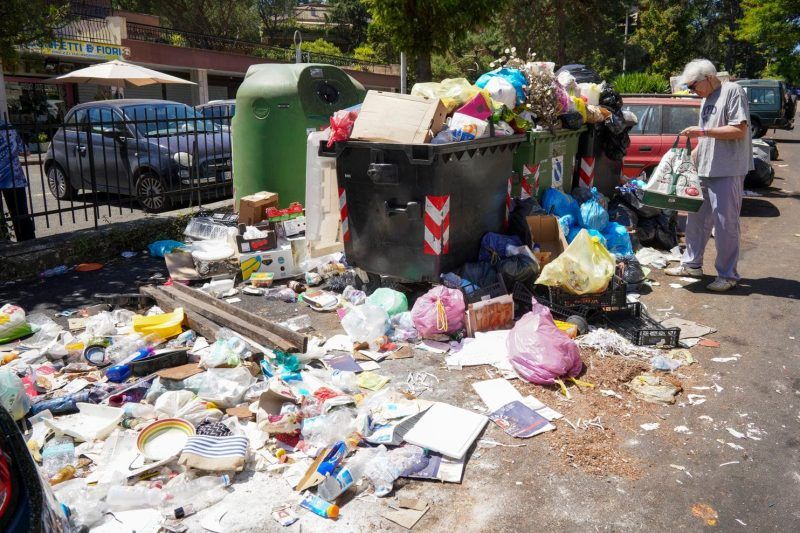
All across Milan, condolences rain down upon the head of the traveler bound for Rome. One Milanesi friend showed me photographs, sent by his niece, of the garbage that hasn’t been cleared from the Roman streets. Another told me to watch out for the smell: “If you haven’t been there for a long time, prepare for a shock”. The expressions of concern are dispensed with just a touch of glee, for Rome, unlike Milan, is now ruled by a mayor from the Five Star Movement. This newish Italian political party was founded by a professional comedian who used to describe politicians as “parasites”, whose leaders rail against the “establishment” and whose electoral lists were filled with people who had never before run for office. Swept into power on a wave of anger, the Five Star Movement has now crashed against some immovable obstacles, one of which is the sanitation department of the city of Rome.
The Five Star Movement controls more than Rome, of course. It also runs the Italian government in partnership with its unlikely coalition partner, the League. The two parties disagree about many things, perhaps most things, from appointments to the economy. But they do have one thing in common: Neither seems to know how, exactly, the revolutionary changes they have promised are going to be carried out. This conundrum matters well beyond Italy, for there is a lot of revolutionary language to be heard on European airwaves at the moment and not a lot of actual change to accompany it.
Part of the problem is just inexperience. It’s all very well to condemn the entire political class, the entire business class, the medical profession, the legal profession and the universities. But how do you run the government without any of those people? The Bolsheviks faced this same problem a century ago, first slaughtering the old guard (not an option in modern Europe) and then desperately seeking to co-opt the ones who survived. The Five Star Movement has chosen instead to elect outsiders, sometimes rather random outsiders, which is fair enough: Politics has always renewed itself that way. But it has also chosen to immediately put some of them in charge of massive bureaucracies. That was what happened to Virginia Raggi, the shaky mayor of Rome ; that’s also what happened to Five Star’s current leader, Luigi Di Maio, a former stadium usher who never completed a formal education and turned 33 on Saturday. Currently, he is deputy prime minister, as well as minister for economic development, labor and social policies, and he’s finding it difficult to cope.
Even trickier is the matter of alliances both within Italy and outside. At his office in Rome, Gianluigi Paragone, a Five Star senator with a big media presence, told me at length about the international financial system and the damage it’s doing to Italy, as well as the unfairness of the European single market, in which companies can choose to get cheaper labor in the Czech Republic or lower taxes in Ireland. Asked for solutions, he said they were all political: “If we want to have a real European politics, you need a real central European bank [and] . . . a European constitution”.
In other words, an anarchic, anti-party party that sometimes sounds virulently Eurosceptic wants . . . more Europe, more coordination, stronger central institutions and unified taxes, all goals that Five Star is uniquely unsuited to achieve. Most European political parties belong to cross-European groupings, sister parties with whom they pursue joint goals. But Five Star can’t find any allies. Paragone couldn’t name any; the party’s European parliamentarians remain nonaligned.
Unsurprisingly, Five Star’s support is beginning to drift away. Its support dropped by half in European Parliament elections at the end of May, while votes for its coalition partner rose. The League has stayed popular thanks to the unique ability of its leader, Interior Minister Matteo Salvini, to dominate news headlines. He does so by making outrageous statements, mostly about immigration, and using his position to create news happenings, among them the recent arrest of a boat captain who rescued migrants from the sea.
But this method of doing politics might also have a short life span. The number of migrants coming from the Middle East and North Africa has plummeted since 2015. The crisis is over. And many of the actual problems of Italy, from youth unemployment to government debt, can be solved, once again, only with the help of experts, allies or sometimes the European institutions Salvini also loves to rail against. If he can keep people distracted until the next election, he might well win big. But if reality, in the form of garbage or something else, suddenly starts to matter, then his party might meet the fate of the Five Star Movement, too.
Anne Applebaum is a Washington Post columnist, covering national politics and foreign policy, with a special focus on Europe and Russia. She is also a Pulitzer Prize-winning historian and a professor of practice at the London School of Economics. She is a former member of The Washington Post's editorial board.
